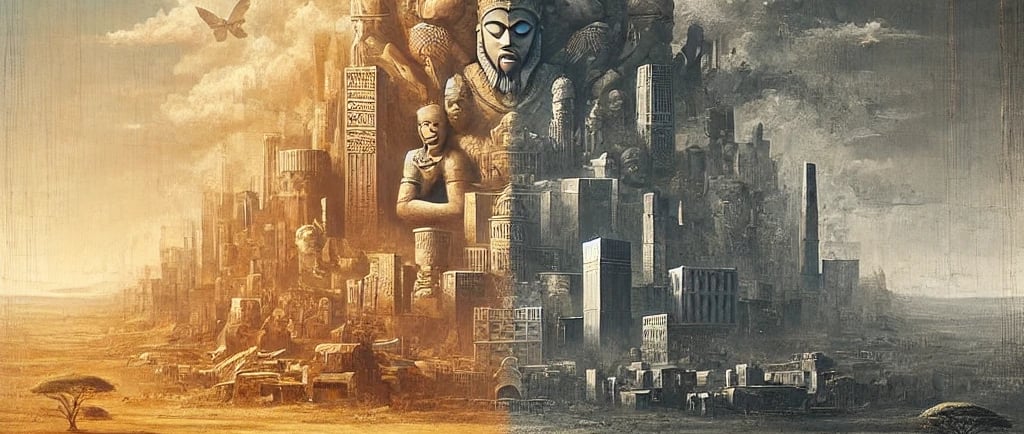Obscuration: The Systematic Erasure of African Histories and Mythologies
Obscuration of history. Obscuration of mythology. Obscuration of religion, culture and traditions. And that's even the half of Africa's loss.
Chinenye Egbuna Ikwuemesi
11/30/20243 min read


Introduction
Throughout history, myths and spiritual beliefs have been the bedrock of cultures, shaping identities and worldviews. In Africa, however, colonisation brought a deliberate and thorough campaign to suppress Indigenous histories and mythologies. This process, known as obscuration, went beyond erasure—it sought to replace African cosmologies with European religious and cultural paradigms systematically. The scale of obscuration in Africa, particularly the brutality with which it was carried out, often exceeded that seen in the colonisation practices of non-African regions.
The result? Rich mythologies like those of Nigeria (I uncover and explore those of the Igbo, Yoruba, Hausa, and Efik in Nigeruan Mythology - The Shadow Sky) and other countries were overshadowed, marginalised, or reframed as superstition. Yet, these stories endure, and reclaiming them is an act of both resistance and celebration.
What Is Obscuration?
Obscuration refers to deliberately suppressing or distorting cultural narratives to elevate foreign ideologies. In the African context, colonisers erased spiritual traditions and mythologies by:
Dismissing indigenous beliefs as “primitive” or “pagan.”
Destroying sacred sites, like Yoruba shrines and Igbo mbari houses.
Replacing traditional rituals with Christian or Islamic practices.
Unlike in colonised European regions, where some myths were preserved (e.g., Norse mythology), African traditions were suppressed with extraordinary thoroughness as colonizers sought to undermine the foundations of African identity.
Examples of Obscuration in African History
The Suppression of Yoruba Orishas
The Yoruba pantheon, led by deities like Sango, Osun, and Olodumare, was systematically targeted by Christian missionaries. Shrines were destroyed, and the Orishas were demonised or reframed as devils. This suppression extended to sacred festivals like the Osun-Osogbo Festival, which was outlawed under colonial rule. Despite this, Yoruba beliefs endured, evolving into syncretic religions like Santería and Candomblé in the Americas.Igbo Mbari Houses and Colonial Destruction
The Igbo tradition of building mbari houses and elaborate shrines to honour deities and ancestors was decimated by colonial officials, who viewed them as idolatrous and declaimed them as such to justify their desecration and destruction. Mbari houses, often painted with Uli designs, were razed, leaving future generations with little knowledge of their spiritual significance.Hausa Bori Spirits and Islamisation
The Bori spirits, central to Hausa spirituality, were gradually suppressed during the Islamic conquests of northern Nigeria. Later, European colonisers dismissed Bori's wholesale practices as superstition. Rituals involving Bori spirits were driven underground, their importance obscured by colonial narratives.The Brutality of Cultural Suppression
Unlike the colonisation of European regions, where some cultural artefacts were preserved, the erasure of African narratives was accompanied by brutality. Colonial authorities targeted not just myths but their custodians—priests, diviners, and griots—eliminating key figures who could preserve these traditions.
How Obscuration Shaped Modern Perceptions
The legacy of obscuration continues today, as African mythologies are often excluded from global conversations about mythology. While European traditions like Greek and Norse myths dominate literature, film, and education, African myths are relegated to the margins. This imbalance reflects the enduring impact of colonial suppression.
However, projects like Afrodeities and The Shadow Sky aim to reverse this trend by reclaiming in some part the richness and complexity of African mythology and bringing it back into the light.
Reclaiming What Was Lost
Reclaiming African mythology is not just an academic exercise—it’s an act of cultural restoration. By telling these stories, we honour the resilience of the communities that preserved them and challenge the narratives that sought to erase them.
Nigerian Mythology: The Shadow Sky is one such effort, spotlighting the deities, spirits, and cosmologies that make Nigerian mythology unique. By exploring these stories, we rediscover our past and find guidance and inspiration for the future.
Conclusion
Obscuration was a calculated effort to erase African histories and mythologies, but the stories remain. They endure in the art, rituals, and memories of the people. As we reclaim these narratives, we restore balance, ensuring that the myths of Africa take their rightful place alongside the great stories of the world.
"The Bridgeworks" is an original civilisational framework developed by Chinenye Egbuna Ikwuemesi within Afrodeities.
Unearthing Africa’s myths, history, and stories together.
© 2024. All rights reserved.
© Chinenye Egbuna Ikwuemesi 2025.
All rights reserved.
The Afrodeities Codex and all associated titles, stories, characters, and mythologies are the intellectual property of the author. Unauthorized use is strictly prohibited.
Goddesses
